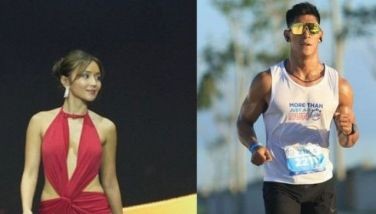The making of a young film scorer
MANILA, Philippines - Few musicians ever get to work as film scorer. For — let’s face it — serious films requiring serious music only come once in a blue moon.
But Diwa de Leon can be an exception at the rate he is swamped with one project after another. He happens to be one of the newsmakers in the recently-concluded Cinemalaya film fest by winning the Best Original Music Score citation for Raymund Red’s Kamera Obskura.
De Leon got the award for music “that evokes the time and culture of the past as a setting for man’s journey through a society marked by pretense and deception in the struggle for power and ascendancy…”
The young musician is no stranger to awards as early as 2008 when he won Cinema One Originals Best Original Music for the film Kolorete directed by Ruelo Lozendo. “This is a very memorable award because aside from the fact that this was also my first-ever solo film scoring project, I got it after the awards ceremony. Due to some misinformation on the part of the judges, they awarded the trophy to the wrong person, but it was corrected a week later. I was presented the award on TV in a special broadcast announcement by Cinema One.”
His second award was in Cinemalaya 2011 where he won both Best Original Music and Best Sound in the Director’s Showcase Category for Auraeus Solito’s Busong.
He said, “I was back in my natural music element in Busong which was reflective of ethnic and world music. The music writing process was very natural for me. It was also the first time I heavily featured the hegalong (an ethnic musical instrument) in a film score that I wrote.”
He considers Red’s Kamera Obskura in 2012 his most massive effort yet as it was conceived and executed in silent film style of the ’20s era.
De Leon pointed out: “Nowadays, film scores only comprise about 30 to 40 percent of the film’s duration which is maybe around 20 to 30 minutes of music. But for Kamera Obskura, I had to score the whole thing. Luckily, my classical training and background made it easy for me to look for music sources that hark back to that era.”
If the surname is familiar, it is because Diwa is the grandson of National Artist for Music Felipe Padilla de Leon and son of another nationalist musician, Felipe Padilla de Leon Jr., who is now chair of the National Commission for Culture and the Arts (NCCA).
A product of the Philippine High School of the Arts where he graduated valedictorian, Diwa admits being associated with a very distinguished family of musicians is virtually like a double-edged sword with the other side quite blunt.
For the less complicated side, he said being a De Leon gives him the ease of not having to explain why he chose to be a full-time musician.
He opined: “The music career, is still a bit frowned upon by the older generation (read: the parents) for the false argument that there is ‘no money in music.’ I just have to say that music has been in my family’s bloodline ever since and that would shut the cynics up. I also enjoy a certain degree of respect from my peers especially those who have recognized my family’s contributions to Philippine music.”
On the other hand, there is a high level of expectation that he fears that he cannot always fulfill. “But I don’t let it bother me too much so I can just focus on writing music. There’s also the tendency for comparison, which some may find to be a bad thing. But in my opinion, I will be very honored if I was compared to my grandfather, National Artist for Music Felipe Padilla de Leon because he is such a great inspiration to myself and many more Filipinos. But lolo will always be in his own league, and no one can be compared to that.”
Although he rebelled during his high school days on being “pressured” to be another musician in the family by taking up visual arts, he later realized that there was no way he could deny his musical genes.
Thus, he looks up to his grandfather as a big source of inspiration.
“My grandfather has always been a stalwart inspiration for me, albeit indirectly,” Diwa said. “I was unfortunate to have become conscious at the time when he was already sickly and bedridden, therefore I wasn’t been able to witness him in action as a great band conductor and composer.
“Thankfully, my father always told me the great stories about my grandfather’s life, especially the story when he sold cigarettes and newspapers in his youth to fund — not just his own musical education — but also the other children in need in his hometown of Penaranda, Nueva Ecija.
“When I need musical ideas for nationalistic songs, I only need to look at my lolo’s archives. My father, along with my mother — writer/poet Anna Leah Sarabia — always pushed me to strive for more. There was a time in my early adulthood that I became content with what I had a little too content now that I look back to it.
“And my parents, especially my father, knew that I could become much, much better in everything, as a person and as a musician. Despite my early resistance, I know they were right, I eventually got up to my feet and didn’t look back, and the rest is history,” he ended.
- Latest
- Trending





























 Exclusive
Exclusive




